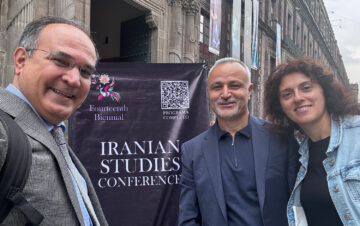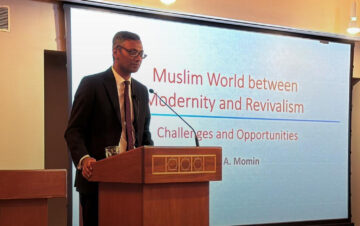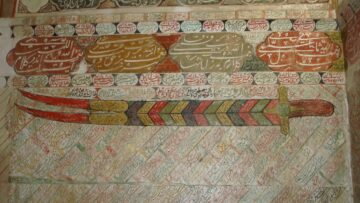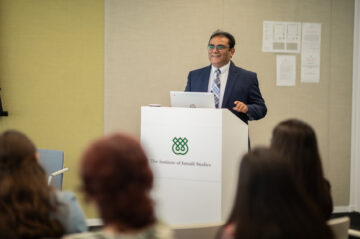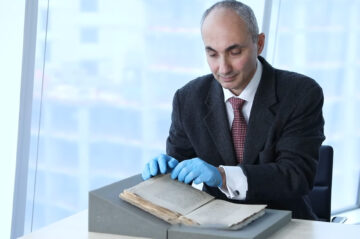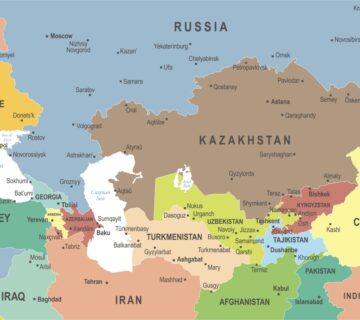Hosted by The Centre for the Study of Islam and Christian-Muslim Relations in Birmingham from 23-26 July, the theme of this year’s BRISMES conference was “Faith, Politics, and Society in the Middle East”. Papers were presented at the conference by Dr Alnoor Dhanani, Dr Ali Qutbuddin, and Salman Alibhai, all of whom are affiliated with the IIS.
Among the keynote speakers at this year’s event were Professor Tariq Ramadan, Professor Jorgen Nielson, and Tarek Mitri. Presentations were grouped into thematic panels such as ‘Islam in a Globalising World’, ‘Politics and Identity’, ‘The Qur’an(also Koran. Arabic term meaning, ‘recitation’ or ‘scripture’): Muslims believe that the Holy Qur’an contains divine revelations to the Prophet Muhammed received in Mecca and Medina over a period of… More and today’s World’, and ‘Interfaith Attitudes’. The conference provided a forum for participants to engage with questions such as: Can religion support political change? Can religion be a force for peace, as it so often claims to be? What are the causes and consequences of a diversity of religious expressions?
Dr Alnoor Dhanani, head of the Institute’s Graduate Programme in Islamic Studies and Humanities (GPISH), presented a paper on “The Soul in Late Kalam” which looked at the different philosophical conceptions of ‘soul’. The ‘soul’, which is central to falsafa and grounded in the views of Plato and Aristotle, plays an important role in many questions including the nature of life, the primary characteristics of being human, and the mechanics of the celestial realm. However, in kalam, falsafa’s intellectual rival, ‘soul’ was a problematic concept. For the majority of the early mutakallimun, who were atomists and materialists, they had to account within their system for the phenomena that falsafa explained by the ‘soul’.
Dr Ali Qutbuddin presented a paper on “Al-Mu’ayyad al-Shirazi’s Refutation of the Mulhid of Ibn al-Rawandi.” Ibn al-Rawandi claimed that intellect and reason were capable of perceiving the religious and philosophical truths, independent of revelation and the prophets. Al-Mu’ayyad al-Shirazi, the 11th century chief missionary for the FatimidsMajor Muslim dynasty of Ismaili caliphs in North Africa (from 909) and later in Egypt (973–1171) More, took the position that reason is not a source of religious, eschatological knowledge, but a receptacle for the knowledge bestowed by God through the Prophets. Thus, intellectual freedom came from acknowledging the potential and the limits of the human intellect, bound, as it were, by the physical body.
Salman Alibhai, a student from the Institute’s Graduate Programme, presented a paper entitled “Negotiating Faith and Diversity: The Da’wa and Dawla of the Fatimids” which discussed the Fatimids’ novel approach to the management of religious and cultural diversity. Through the flexibility of the Ismaili da‘wa, the separation of secular and religious state bureaucracies, and the recognition of independent leadership and partial autonomy for particular groups, the Fatimids were able to create and sustain an inclusive polity in which multiple religious traditions found common ground. Thus, during Fatimid times, the criterion for material success and advancement came to be based largely on individual merit rather than religious affiliation.
The British Society for Middle Eastern Studies (BRISMES), established in 1973, promotes the study of the Middle East in the United Kingdom. Its annual conference brings together teachers, researchers, students, diplomats, journalists and others who deal professionally with the Middle East. An important focus of discussion at this year’s conference was exploring ways of opening up new dialogues between Christians and Muslims. Within this forum, scholars presented examples from their own religious traditions of ways in which dialogue occurs and how it can continue to occur to foster the mutual values of respect and diversity.

